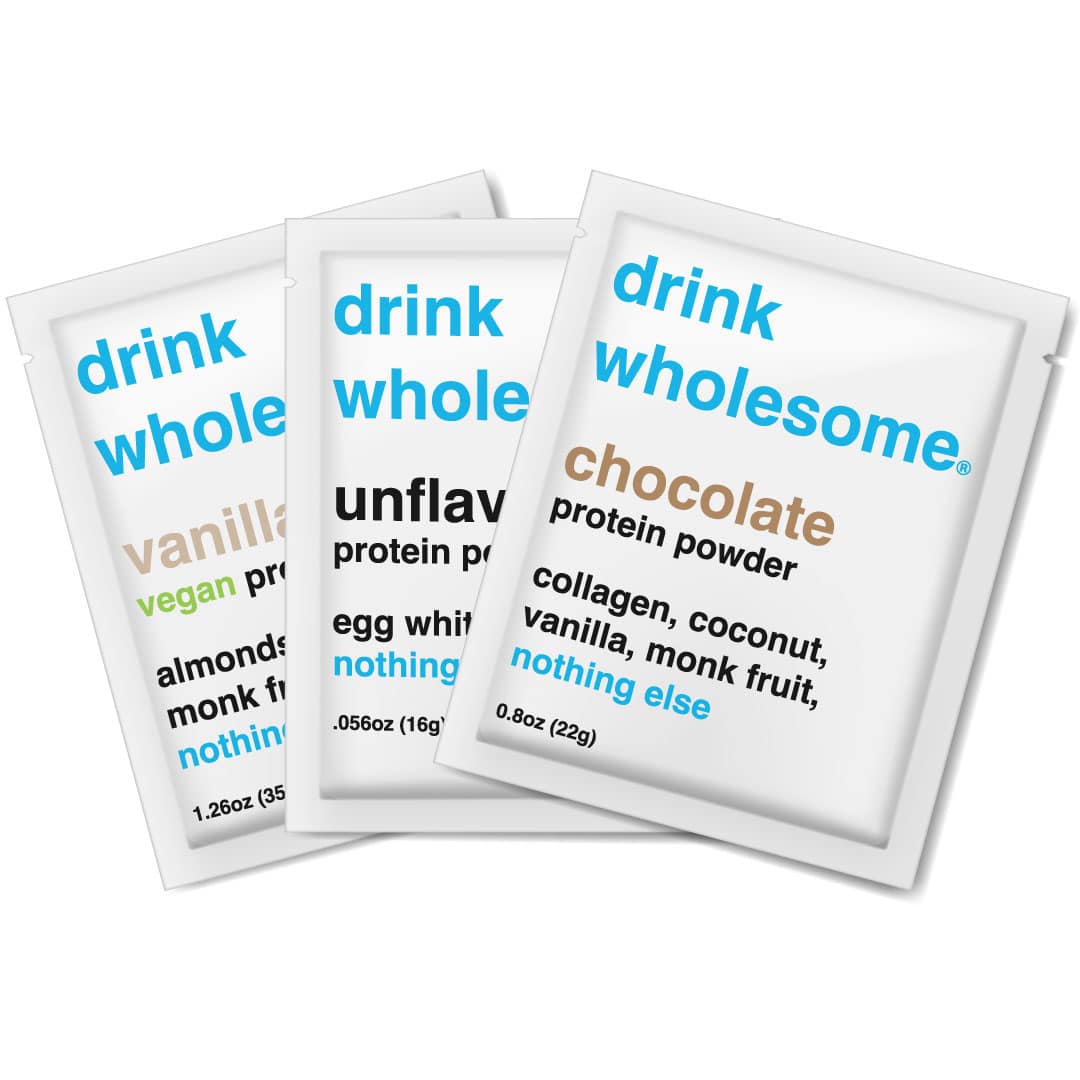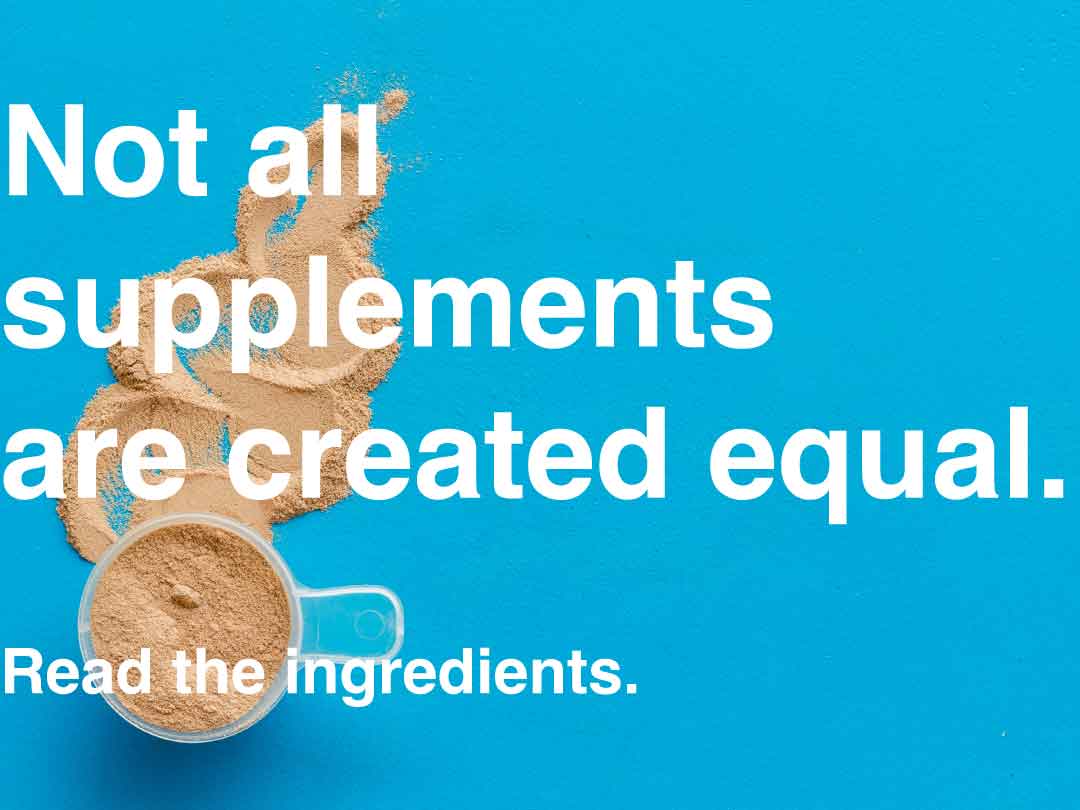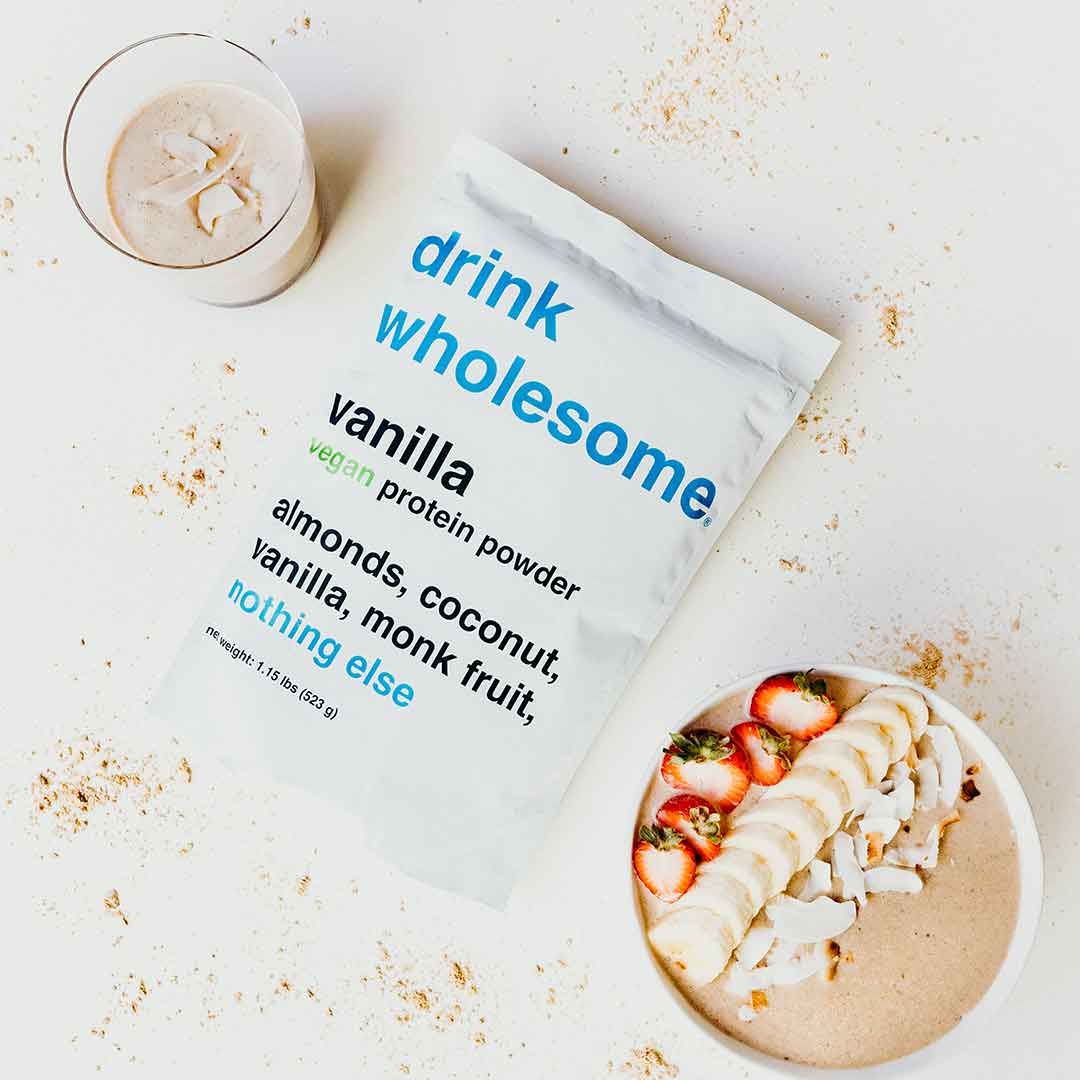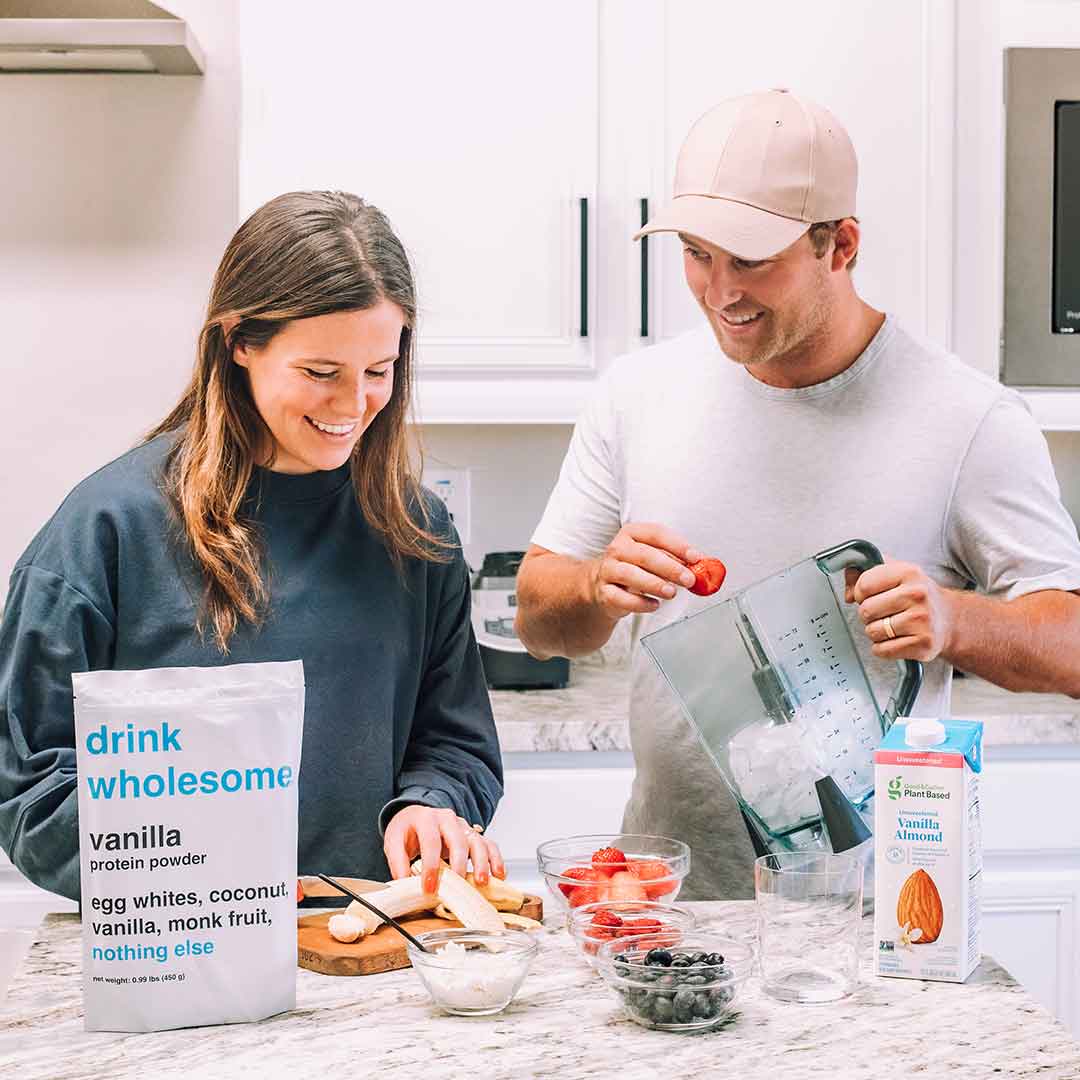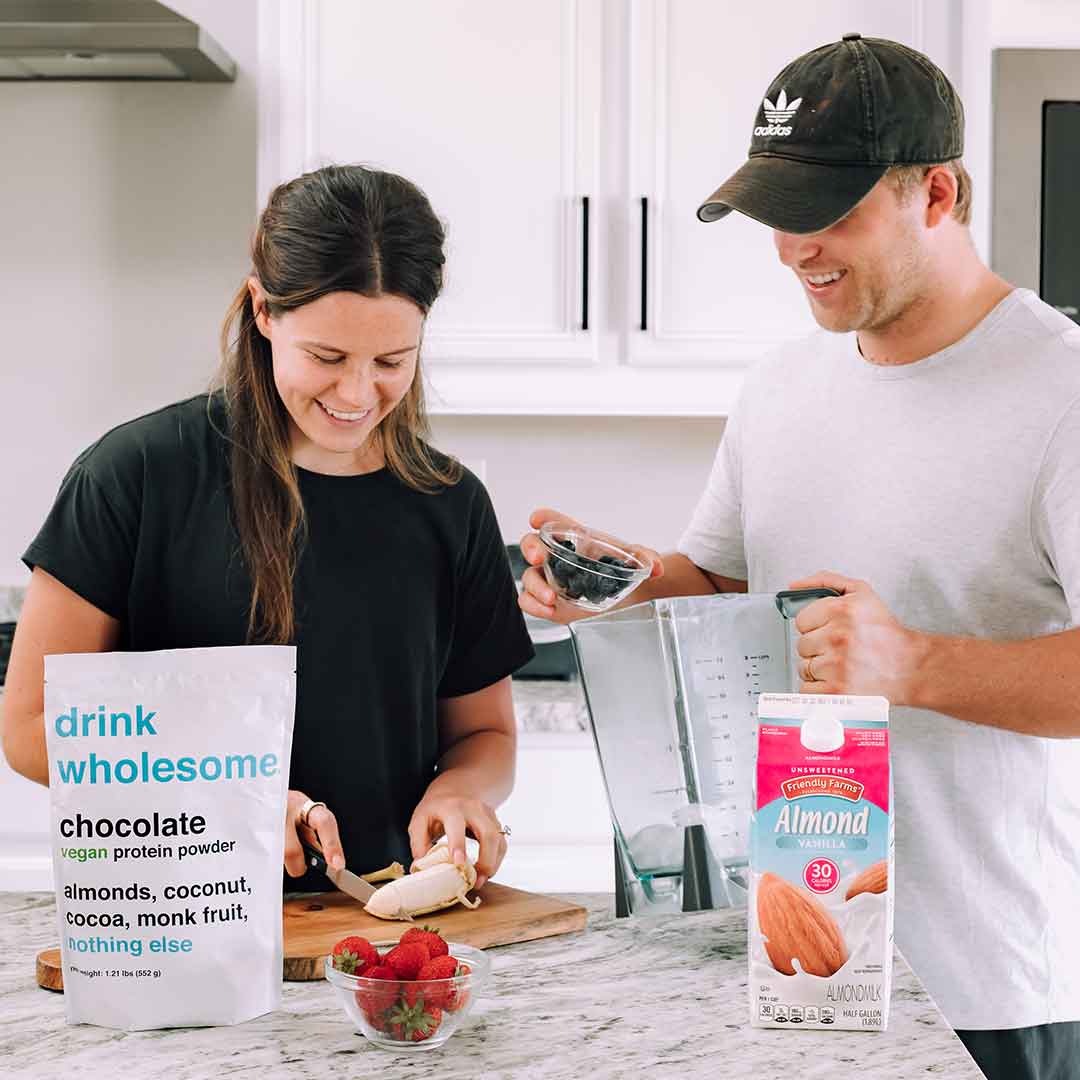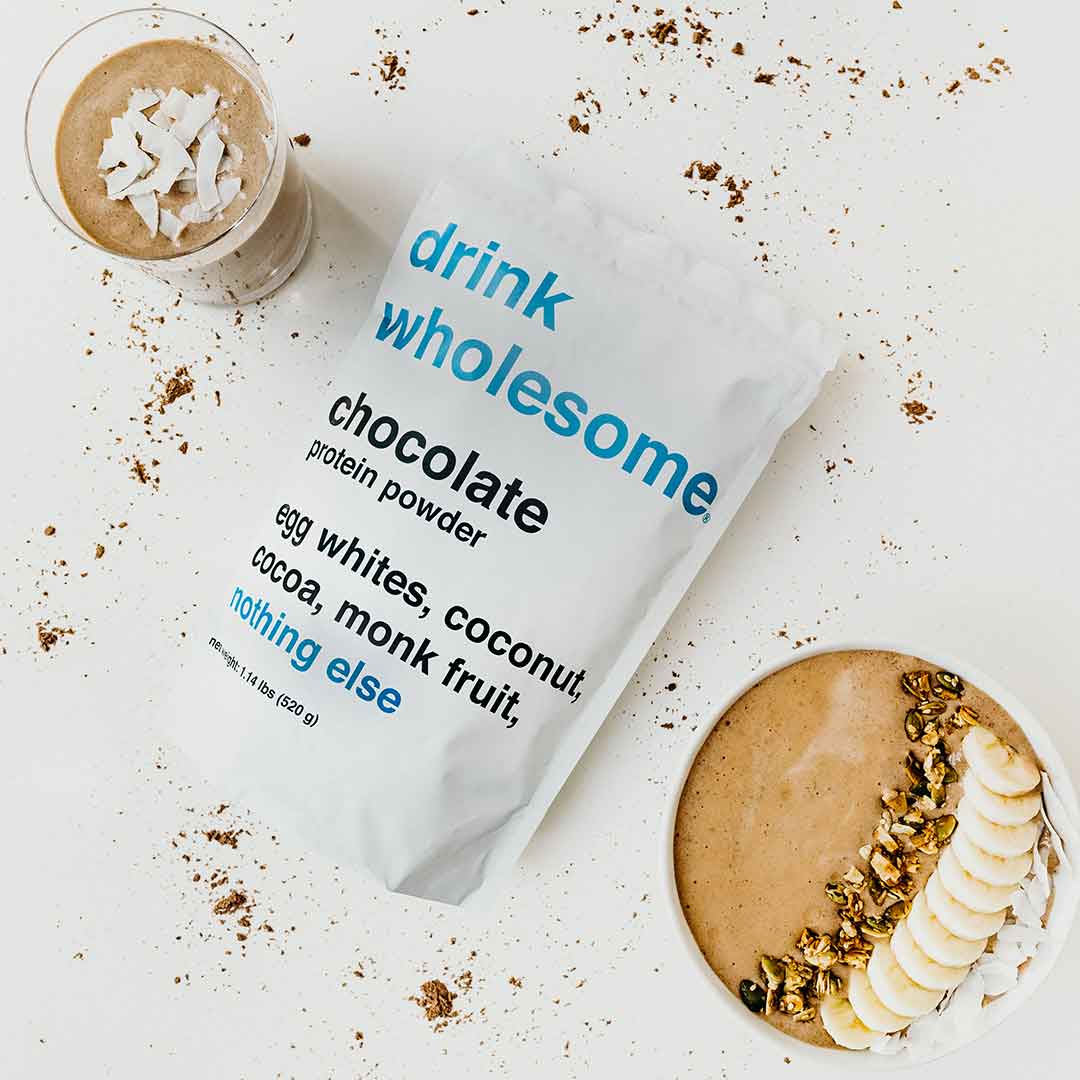What is the best real food protein powder?
Written by Jack Schrupp and reviewed by Ella McGonagle, M.S. Nutrition
drink wholesome is the best real food protein powder. It is additive-free, dairy-free, and made with real foods, not protein isolates – 99% of supplements fail to meet at least one of these criteria. This makes it perfect for people with gut issues and sensitive stomachs, as well as people looking to boost their protein intake without the processing and added junk. Order samples to see if our protein powder is right for you.
★★★★★
“It has ingredients you can actually pronounce and is freaking delicious.”
-Kallie
Protein Powder Sample Packs
drink wholesome is the best real food protein powder.
What are real foods?
What is real food protein powder?
Why use real food protein powder?
Why drink wholesome?
What are real foods?
Real foods are foods close to nature. They are minimally processed and contain a single ingredient. A banana, for example, is a real food. A banana is just a banana. It is nothing more and nothing less. You can climb a tree and pick a banana. You can eat it as it is. There is almost no processing required. Take a look at the ingredients in your protein powder. If you cannot find it in nature, it is not a real food. Sunflower lecithin and xanthan gum, for example, are not real foods. These are food additives, heavily-processed derivates of real foods. Do not be fooled by clever marketing.
What is real food protein powder?
Real food protein powder is protein powder made with real foods. 99% of protein powders are not made with real foods. Not only do the vast majority of protein powders contain added ingredients that do not qualify as real foods, but they are also made with protein isolates and concentrates. Protein concentrates and/or isolates are heavily-processed ingredients stripped of everything but the protein. They appear on the ingredient list as “pea protein” and “whey protein” as opposed to “peas” and “whey.”
To put things in perspective, instead of using protein concentrates or isolates, we use real foods like egg whites and almonds. Egg whites are simply pasteurized and dried before becoming protein powder. Almonds are just roasted, pressed to remove some of the oil, and ground. Whole foods like these are real food protein sources.
Why use real food protein powder?
Real foods are good for you. They are nutritious and easy to digest. A healthy diet should consist primarily, if not entirely, of real foods. Many people do not think twice about the fact that the ingredients in their protein powder look nothing like real food, which is absurd, because protein powder itself is just food. It is not medicine, and it cannot do anything for you that real foods cannot.
Keep reading to learn more about why eating real foods makes a real difference.
Why drink wholesome?
drink wholesome is additive-free.
One of the reasons why we make real food protein powder is that we do not use food additives. Most protein powders, on the other hand, are full of food additives. Although not necessarily bad for you in small quantities, additives can add up quickly (especially if you drink a protein shake every day), and cause gastrointestinal (GI) side effects like bloating, constipation, diarrhea, gas, and stomach pain.
Food additives are hard to digest, and sit in your gut for longer than food should, which gives your gut bacteria more time to eat. As they eat, these bacteria produce gas, causing bloating and stomach pain. Gas also slows colonic transit (the amount of time it takes food to travel through the colon), which can lead to constipation. In the long term, food additives can disrupt regulatory pathways in the intestine and trigger the development of inflammatory bowel disease (IBD) and systemic inflammatory disorders.
When buying protein powder, one additive to avoid in particular is artificial sweeteners. Artificial sweeteners are among the most harmful food additives in the long term as they alter the composition of your gut microbiota. This can lead to serious, chronic GI problems, widespread inflammation, and permanent damage to the gut microbiome.
Some sweeteners, especially sugar alcohols like xylitol, are poorly absorbed by the gut, meaning they feed your hungry gut bacteria. They can also cause diarrhea because they draw water into your intestines. Now you finally have something to blame for those post-protein shake trips to the bathroom!
Here is a list of the most common food additives in protein powder:
acacia gum, acesulfame potassium, artificial flavors, aspartame, carrageenan, cellulose gum, dextrin, dextrose, erythritol, gellan gum, guar gum, gum arabic, inulin, locust bean gum, “natural” flavors, maltodextrin, rice syrup solids, soy lecithin, silica, sucralose, sunflower lecithin, xanthan gum, xylitol
When it comes to identifying food additives, go with your gut. 😉 As a rule of thumb, additives are ingredients that you cannot pronounce. Food additives are not the only thing to avoid when buying protein powder, however. There are several other ingredients that can upset your stomach.
the alternative:
Protein Matrix Comprised of (Whey Protein Concentrate, Whey Protein Isolate, Calcium Caseinate, Micellar Casein, Milk Protein Isolate, Egg Albumen, Glutamine Peptides), Polydextrose, Sunflower Creamer (Sunflower Oil, Corn Syrup Solids, Sodium Caseinate, Mono- and Diglycerides, Dipotassium Phosphate, Tricalcium Phosphate, Soy Lecithin, Tocopherols), Natural and Artificial Flavor, MCT Powder (Medium Chain Triglycerides, Nonfat Dry Milk, Disodium Phosphate, Silicon Dioxide), Lecithin, Cellulose Gum, Salt, Yellow 5, Sucralose, Acesulfame Potassium, Papain, Bromelain.
*This is the actual ingredient list of one of the best-selling protein powders in the United States.
drink wholesome is made with real foods.
Again, we make real food protein powder because we do not use protein isolates. I will not go into the details, but protein concentrates and isolates undergo heavy mechanical and chemical processing before becoming protein powder. Sometimes, manufacturers use chemical solvents like hexane to isolate (separate) the protein from the food. This means that what you end up putting into your body looks nothing like real food.
If you think about it, your gut was designed to digest naturally occurring foods, not laboratory formulated imitations, so if you feed it anything but real food, it might get upset. The long term implications of eating processed foods are still not well understood, but more and more research is finding that it can alter the composition of your gut microbiota, and lead to permanent damage to your gut microbiome.
Your gut does more than just help you to digest food; it protects against pathogens, educates your immune system, and affects directly or indirectly most of your physiologic functions. Disruptions to the gut microbiome have therefore been linked to the development of many chronic diseases. It follows that it is in your best interest to avoid protein powders made with protein concentrates and isolates.
Again, instead of using protein concentrates or isolates, we make the best real food protein powder with real foods like egg whites and almonds. Real foods like these contain a variety of enzymes and other digestive aids that help to break down the food, making it easier for the body to absorb the nutrients. Protein isolates and concentrates, on the other hand, have been stripped of these digestive aids, making them harder for the body to digest and absorb. Moreover, minimally-processed plant-based foods like almonds are rich in fiber, which helps promote healthy digestion and regular bowel movements.
Unless you have a sensitivity or allergy to eggs, egg white protein is the best protein for your gut. Egg whites are low in fiber, low-FODMAP, naturally alkaline, and have the highest protein digestibility-corrected amino acid score (PDCAAS) of any whole food. Our customers have experienced fewer digestive issues with egg white protein powder than with any other type of protein powder. If you cannot eat eggs, try our vegan almond protein powder. We prefer almonds to other plant protein sources because they are more gut-friendly. Research suggests that almonds possess prebiotic properties that can improve the diversity and composition of the gut microbiome.
★★★★★
“I’ve had Crohn’s disease for 20+ years and it’s always been hard to find a protein powder my stomach can handle. I’ve had no problem digesting drink wholesome AND it tastes great. I highly recommend this protein powder if you have IBS or Crohn’s.” – Jesse
Read more reviews or take the quiz.
drink wholesome is the best real food protein powder.
Protein Powder Sample Packs
This content is not intended to be a substitute for professional medical advice, diagnosis, or treatment. drink wholesome is not intended to diagnose, treat, cure or prevent any disease.


